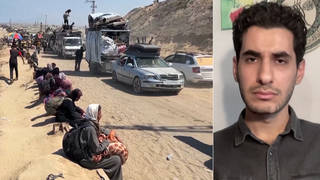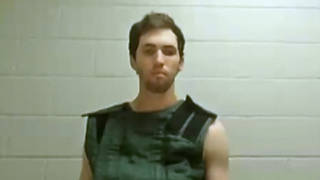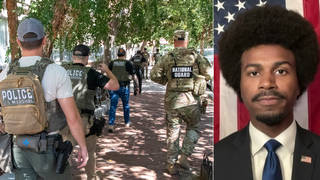Hi there,
From our first broadcast nearly 30 years ago, Democracy Now! has always been fiercely independent. Over these last 3 decades, our daily global news hour has been a source of truth in a media landscape all too often bought by commercial interests. Can you start a monthly donation? Monthly donations are the lifeblood of Democracy Now!.Thanks to a group of generous donors, all monthly donations started today will be DOUBLED, which means your $15 gift is worth $30. If you believe that freedom of speech and freedom of the press are essential to the functioning of a democratic society, please donate today. Every dollar makes a difference. Thank you so much.
Democracy Now!
Amy Goodman
Hi there,
From our first broadcast nearly 30 years ago, Democracy Now! has always been fiercely independent. Over these last 3 decades, our daily global news hour has been a source of truth in a media landscape all too often bought by commercial interests. Can you start a monthly donation? Monthly donations are the lifeblood of Democracy Now!.Thanks to a group of generous donors, all monthly donations started today will be DOUBLED, which means your $15 gift is worth $30. If you believe that freedom of speech and freedom of the press are essential to the functioning of a democratic society, please donate today. Every dollar makes a difference. Thank you so much.
Democracy Now!
Amy Goodman
Non-commercial news needs your support.
We rely on contributions from you, our viewers and listeners to do our work. If you visit us daily or weekly or even just once a month, now is a great time to make your monthly contribution.
Please do your part today.
HeadlinesJune 12, 2009
Admin Rules Out US Resettlement for Gitmo Prisoners
The Obama administration says it’s scrapping plans to let foreign prisoners cleared for release from Guantanamo Bay live in the United States. The White House had already announced its opposition to admitting a group of seventeen Chinese Uyghur prisoners even though they were no longer designated “enemy combatants” and ordered immediately freed. Administration officials cited congressional opposition to the Uyghurs’ release in arguing they stood no chance in convincing lawmakers to accept other freed prisoners.
6 Gitmo Prisoners Freed
The news comes as four of the Uyghur prisoners have been released to Bermuda, where they will live as foreign guest workers. The US is still in talks to send the remaining thirteen to the Pacific archipelago of Palau. Two other Guantanamo prisoners were also released Thursday and sent to their home countries of Iraq and Chad. The Chadian, Mohammed El Gharani, was the youngest Guantanamo Bay prisoner on record, having been arrested in Pakistan at the age of fourteen.
Dems Reach Agreement on War Funding Bill
Congressional Democrats, meanwhile, have reached an agreement on a war funding bill that would authorize the transfer of Guantanamo prisoners to stand trial in the United States. The measure does not include language allowing indefinite detention as President Obama has initially proposed. The White House also dropped a request for a provision imposing a congressional ban on the release of photos showing the abuse of prisoners at US jails in Iraq and Afghanistan. President Obama said he will continue to seek the photos’ censorship through an appeal to the Supreme Court.
Antiwar Lawmakers Urge Rejection of War Funding
The war funding bill includes more than $90 billion for the occupation of Iraq and Afghanistan and is expected be voted on next week. In a letter to other House members who have previously opposed war funding, Congress members Lynn Woolsey of California and Dennis Kucinich of Ohio urged them to retain “steadfast opposition” to the new bill. Speaking on the House floor, Kucinich said the occupation of Iraq and Afghanistan is based on “aggression and lies.”
Rep. Dennis Kucinich: “A new administration and the same old war, and expansion of the war in Afghanistan. We cannot afford these wars spiritually. They are wars of aggression, and they’re based on lies. We cannot afford these wars financially. They add trillions to our national debt and destroy our domestic agenda. We cannot afford the human cost of these wars, the loss of lives of our beloved troops and the deaths of innocent civilians in Iraq, Afghanistan and Pakistan.”
Senate Backs Sweeping Tobacco Regulation
The Senate has approved a measure that would strengthen government regulation over the tobacco industry. On Thursday, Senators voted 79-to-17 to give the Food and Drug Administration new authority in overseeing the manufacture and marketing of tobacco. The FDA would be able to ban the most harmful of the thousands of chemicals used in cigarettes and reduce the amount of nicotine. Tobacco companies would also be forced to disclose the ingredients in their products. The House passed a similar measure last month. A longtime cigarette smoker himself, President Obama has vowed to sign the legislation into law.
Contradicting Obama, Sen. Baucus Rules Out “Public” Healthcare
President Obama was in Green Bay, Wisconsin, Thursday to promote his push for healthcare reform. Speaking at a town hall-style event, Obama rejected criticism of his calls for creating a government-run public insurance program that would compete with private insurers.
President Obama: “To those who criticize our efforts, I ask them, ’What’s the alternative?’ What else do we say to all the families who spend more on healthcare than on housing or on food? What do we tell those businesses that are choosing between closing their doors and letting their workers go?”
Obama’s comments were aimed at critics who have opposed any type of public health plan. Private insurers have opposed a government-run program out of fear they’d be unable to compete with its cheaper costs. Obama did not, however, address his progressive critics who advocate the creation of a single-payer system that would eliminate for-profit insurance companies entirely. As Obama promoted his version of a public insurance program, a key Senate Democrat said he would oppose any form of public healthcare. Max Baucus, the Senate Finance Committee chair leading congressional efforts on healthcare reform, said he would propose a plan based on creating member-based insurance cooperatives not run by the government. Baucus explicitly ruled out using the word “public,” saying, “It’s not going to be public, we won’t call it public, but it will be tough enough to keep insurance companies’ feet to the fire.”
Von Brunn Charged with Murder in Holocaust Museum Shooting
The white supremacist James von Brunn has been charged with murder for Wednesday’s shooting death of a security guard at the Holocaust Memorial Museum in Washington, DC. The security guard, Stephen Johns, was thirty-nine years old. On Thursday, Johns’s mother, Jacqueline Carter, spoke of her son’s life.
Jacqueline Carter: “He was just a beautiful person. He liked his job, and he worked a lot. And it would be just like him to try to, you know, protect people from harm.”
Von Brunn remains in critical condition from wounds sustained when other security guards returned fire. Meanwhile, on Thursday the FBI acknowledged it had been “aware” of Von Brunn’s hateful writings about religious and ethnic minorities but that it never launched a criminal probe.
WHO Declares Swine Flu Pandemic
The World Health Organization has declared the outbreak of the swine flu a global pandemic. On Thursday, the WHO raised its pandemic alert level to six, its highest level. Health officials say the alert level means the swine flu has spread to two world regions and doesn’t signify a likely increase in deaths or serious cases.
General: Afghan Violence Worse Since 2001
The top US military commander in the Middle East says violence in Afghanistan has reached its highest level since the US-led invasion of 2001. General David Petraeus said the attacks hit a more than seven-year high last week. Addressing the public outrage in Afghanistan over scores of deadly US attacks, Petraeus said, “This is the graveyard of empires…It is a place that has never taken kindly to would-be conquerors.”
Iran Holds Presidential Elections
In Iran, a record turnout is expected today for a presidential election between incumbent Mahmoud Ahmadinejad and three opposition candidates. Ahmadinejad is facing a stiff challenge from Mir-Hossein Mousavi, an architect and artist who served as prime minister of Iran between 1981 and 1989.
Carter: Hamas Key to Future Peace Deal
Former President Jimmy Carter is renewing criticism of the US-led boycott of the elected Hamas government in the Gaza Strip. Speaking on a visit to Syria, Carter said the US and Israel should drop their refusal to deal with a Palestinian unity government that includes Hamas. Carter also called for a prisoner exchange that would see the return of the Israeli soldier Gilad Shalit in Gaza for some of the more than 10,000 Palestinians in Israeli jails.
Jimmy Carter: “I don’t believe there’s any possibility to have peace between Palestinians and Israel unless Hamas is involved directly in harmony with Fatah. My hope is that we could soon see some agreement between Hamas and Israel with the release of Shalit and an equivalent release of prisoners that Israel is holding of Palestinians.”
Aid Groups to Return to Darfur
In Sudan, the Sudanese government has authorized several aid groups to return to Darfur. Sudan expelled the groups in March after the International Criminal Court charged President Omar Hassan al-Bashir with committing war crimes in Darfur. UN Emergency Relief Coordinator John Holmes said the groups have been readmitted on the condition they change their names and logos. Holmes also said the aid groups will return to humanitarian crisis that worsened during their absence.
UN Emergency Relief Coordinator John Holmes: “However effective the efforts of the government, United Nations and remaining NGOs have been in preventing a further immediate crisis, they have not yet replaced and cannot easily or rapidly replace the capacity and skills lost. Current levels of assistance in some areas remain well below the necessary standards to which we subscribe, and as we enter the hunger gap and rainy season, the needs and gaps will only be further exacerbated.”
Thousands of Peruvians Rally Against Indigenous Crackdown
In Peru, thousands of people took part in nationwide demonstrations Thursday to support an indigenous protest against oil and natural gas exploration in the Amazon rainforest. Police used tear gas on a crowd of at least 20,000 protesters near the National Congress in Lima. Tensions have flared after last week’s police killings of scores of civilians at an indigenous roadblock. On a visit to Cuba, Bolivian President Evo Morales voiced support for the indigenous protests.
Bolivian President Evo Morales: “It’s not possible that the most oppressed people in Latin America’s history be humiliated like we have seen in recent days in some regions. We hope these problems are a lesson in understanding the demands, the demands of defending life, the environment, the planet earth and humanity, as Fidel said.”
The unrest in Peru has ties to US trade policy. The land laws that sparked the uprising were passed under “fast track” authority granted to Peruvian President Alan Garcia’s government to implement the US-Peru Free Trade Agreement.
Activists Protest Schumer for Backing Peru Trade Deal
On Thursday, three activists were released from jail following their arrest for blockading the New York offices of Democratic Senator Charles Schumer. The activists say they confronted Schumer for his refusal to address human rights concerns in voting for the US-Peru trade deal in 2007.
New Mountaintop Removal Rules Criticized as Ineffective
Environmental groups and Appalachian activists are criticizing new Obama administration rules on mountaintop removal as too lax on the coal industry. On Thursday, the White House unveiled new regulations governing mountaintop removal, the controversial coal mining practice that has caused extensive environmental damage in the Appalachian region. The changes include ending fast-track approval for new mining permits, imposing more extensive environmental reviews, and asserting federal authority over state-level regulators. But critics say the rules offer few specifics and will have little effect, if any. Joan Mulhern of Earthjustice said, “The administration is proposing…to essentially [rearrange] the bureaucratic deck chairs on the disastrous ship that is mountaintop removal. They announced…no substantive policies to actually stop the destruction [it’s] caused.”
Interior Dept. Report Criticizes Bush Sale of Utah Federal Land
A new Department of Interior report has faulted the Bush administration for its rush to sell off oil and gas exploitation rights on vast swaths of federal land in Utah last year. The report says the Bush administration did not follow longstanding procedures in trying to sell off twenty-two parcels of land. The sale was later canceled by Obama administration Interior Secretary Ken Salazar. The report’s findings could bolster the defense of a college student who disrupted the auction by posing as a bidder. The student, Tim DeChristopher, is currently facing ten years in prison on charges of interfering with a public auction.
Iraq War Vet Commits Suicide
In California, a twenty-four-year-old Iraq war veteran has committed suicide. Former Army Specialist Trevor Hogue was found dead in his childhood home last week. He had hung himself to death. His mother says he was left seriously emotionally scarred after witnessing a bombing attack on other members of his unit.
Owner of Medical Marijuana Dispensary Sentenced to One-Year Term
An owner of a California dispensary for medical marijuana has been sentenced to one year in prison. The owner, Charles Lynch, was given the jail term despite the Obama administration’s vow not to prosecute medical dispensers who comply with state law. But Federal Judge George Wu said the new federal policy would not affect his ruling.
Survey: 2.8M Homes Unprepared for Switch to Digital TV
And analog television signals will shut off tonight as the US completes the transition to digital TV. The survey group Nielson says around 2.8 million homes remain unprepared for the switch. Most of the unprepared households fall in the low-income, elderly and rural demographics.
Most popular
- 1
- 2
- 3
- 4
Non-commercial news needs your support
Please do your part today.











Media Options